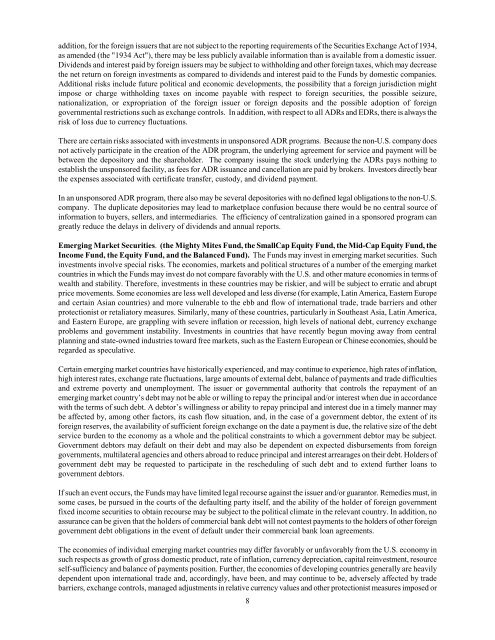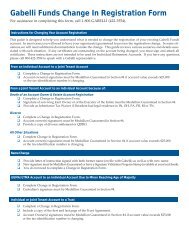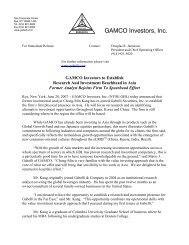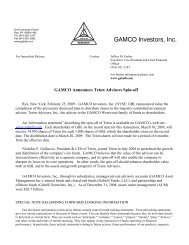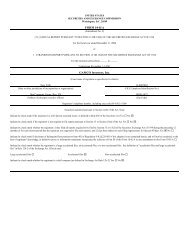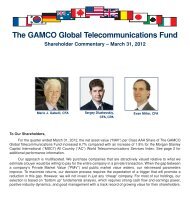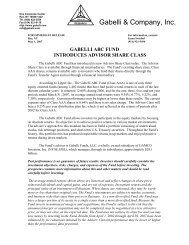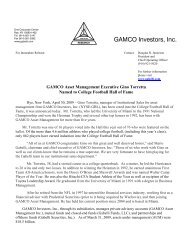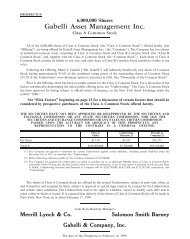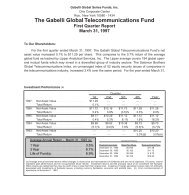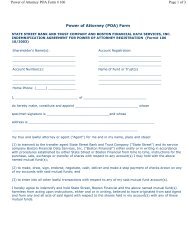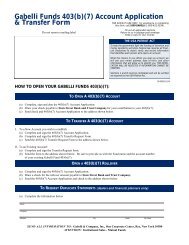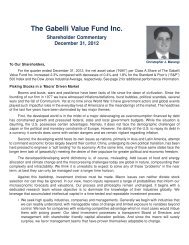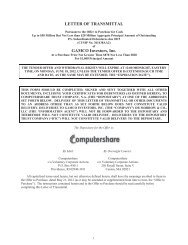Statement of Additional Info - Gabelli
Statement of Additional Info - Gabelli
Statement of Additional Info - Gabelli
You also want an ePaper? Increase the reach of your titles
YUMPU automatically turns print PDFs into web optimized ePapers that Google loves.
addition, for the foreign issuers that are not subject to the reporting requirements <strong>of</strong> the Securities Exchange Act <strong>of</strong> 1934,<br />
as amended (the "1934 Act"), there may be less publicly available information than is available from a domestic issuer.<br />
Dividends and interest paid by foreign issuers may be subject to withholding and other foreign taxes, which may decrease<br />
the net return on foreign investments as compared to dividends and interest paid to the Funds by domestic companies.<br />
<strong>Additional</strong> risks include future political and economic developments, the possibility that a foreign jurisdiction might<br />
impose or charge withholding taxes on income payable with respect to foreign securities, the possible seizure,<br />
nationalization, or expropriation <strong>of</strong> the foreign issuer or foreign deposits and the possible adoption <strong>of</strong> foreign<br />
governmental restrictions such as exchange controls. In addition, with respect to all ADRs and EDRs, there is always the<br />
risk <strong>of</strong> loss due to currency fluctuations.<br />
There are certain risks associated with investments in unsponsored ADR programs. Because the non-U.S. company does<br />
not actively participate in the creation <strong>of</strong> the ADR program, the underlying agreement for service and payment will be<br />
between the depository and the shareholder. The company issuing the stock underlying the ADRs pays nothing to<br />
establish the unsponsored facility, as fees for ADR issuance and cancellation are paid by brokers. Investors directly bear<br />
the expenses associated with certificate transfer, custody, and dividend payment.<br />
In an unsponsored ADR program, there also may be several depositories with no defined legal obligations to the non-U.S.<br />
company. The duplicate depositories may lead to marketplace confusion because there would be no central source <strong>of</strong><br />
information to buyers, sellers, and intermediaries. The efficiency <strong>of</strong> centralization gained in a sponsored program can<br />
greatly reduce the delays in delivery <strong>of</strong> dividends and annual reports.<br />
Emerging Market Securities. (the Mighty Mites Fund, the SmallCap Equity Fund, the Mid-Cap Equity Fund, the<br />
Income Fund, the Equity Fund, and the Balanced Fund). The Funds may invest in emerging market securities. Such<br />
investments involve special risks. The economies, markets and political structures <strong>of</strong> a number <strong>of</strong> the emerging market<br />
countries in which the Funds may invest do not compare favorably with the U.S. and other mature economies in terms <strong>of</strong><br />
wealth and stability. Therefore, investments in these countries may be riskier, and will be subject to erratic and abrupt<br />
price movements. Some economies are less well developed and less diverse (for example, Latin America, Eastern Europe<br />
and certain Asian countries) and more vulnerable to the ebb and flow <strong>of</strong> international trade, trade barriers and other<br />
protectionist or retaliatory measures. Similarly, many <strong>of</strong> these countries, particularly in Southeast Asia, Latin America,<br />
and Eastern Europe, are grappling with severe inflation or recession, high levels <strong>of</strong> national debt, currency exchange<br />
problems and government instability. Investments in countries that have recently begun moving away from central<br />
planning and state-owned industries toward free markets, such as the Eastern European or Chinese economies, should be<br />
regarded as speculative.<br />
Certain emerging market countries have historically experienced, and may continue to experience, high rates <strong>of</strong> inflation,<br />
high interest rates, exchange rate fluctuations, large amounts <strong>of</strong> external debt, balance <strong>of</strong> payments and trade difficulties<br />
and extreme poverty and unemployment. The issuer or governmental authority that controls the repayment <strong>of</strong> an<br />
emerging market country’s debt may not be able or willing to repay the principal and/or interest when due in accordance<br />
with the terms <strong>of</strong> such debt. A debtor’s willingness or ability to repay principal and interest due in a timely manner may<br />
be affected by, among other factors, its cash flow situation, and, in the case <strong>of</strong> a government debtor, the extent <strong>of</strong> its<br />
foreign reserves, the availability <strong>of</strong> sufficient foreign exchange on the date a payment is due, the relative size <strong>of</strong> the debt<br />
service burden to the economy as a whole and the political constraints to which a government debtor may be subject.<br />
Government debtors may default on their debt and may also be dependent on expected disbursements from foreign<br />
governments, multilateral agencies and others abroad to reduce principal and interest arrearages on their debt. Holders <strong>of</strong><br />
government debt may be requested to participate in the rescheduling <strong>of</strong> such debt and to extend further loans to<br />
government debtors.<br />
If such an event occurs, the Funds may have limited legal recourse against the issuer and/or guarantor. Remedies must, in<br />
some cases, be pursued in the courts <strong>of</strong> the defaulting party itself, and the ability <strong>of</strong> the holder <strong>of</strong> foreign government<br />
fixed income securities to obtain recourse may be subject to the political climate in the relevant country. In addition, no<br />
assurance can be given that the holders <strong>of</strong> commercial bank debt will not contest payments to the holders <strong>of</strong> other foreign<br />
government debt obligations in the event <strong>of</strong> default under their commercial bank loan agreements.<br />
The economies <strong>of</strong> individual emerging market countries may differ favorably or unfavorably from the U.S. economy in<br />
such respects as growth <strong>of</strong> gross domestic product, rate <strong>of</strong> inflation, currency depreciation, capital reinvestment, resource<br />
self-sufficiency and balance <strong>of</strong> payments position. Further, the economies <strong>of</strong> developing countries generally are heavily<br />
dependent upon international trade and, accordingly, have been, and may continue to be, adversely affected by trade<br />
barriers, exchange controls, managed adjustments in relative currency values and other protectionist measures imposed or<br />
8


